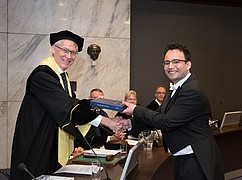PhD Defence: Tim Lamballais Tessensohn

In his dissertation ‘Optimizing the Performance of Robotic Mobile Fulfillment Systems’ Tim Lamballais Tessensohn studies the performance of robotic mobile fulfillment systems by solving decision problems related to warehouse design, inventory and resource allocation, and real-time operations.
Tim Lamballais Tessensohn defended his dissertation in the Senate Hall at Erasmus University Rotterdam on Thursday, 16 May 2019 at 09:30. His supervisors were Prof. René de Koster (RSM) and Dr Debjit Roy (RSM). Other members of the Doctoral Committee are Prof. Rob Zuidwijk (RSM), Prof. Leena Suhl (University of Paderborn) and Prof. Ivo Adan (TU Eindhoven).
About Tim Lamballais Tessensohn

Tim Lamballais Tessensohn was born on February 13th 1988 in Capelle aan den IJssel, the Netherlands. After graduation in 2006 from Marnix Gymnasium he spent two years studying Architecture in Delft before entering the Bachelor program of Econometrics and Operations Research in Rotterdam. In 2012 he graduated cum laude in the master program Econometrics and Management Science with a specialization in Operations Research and Quantitative Logistics. Before his graduation he worked for two years as a research assistant in the field of Entrepreneurship at the department of Applied Economics, where he conducted research on the relationship between the business cycle and entrepreneurship. From 2012 to 2016 he was a PhD candidate at the Rotterdam School of Management, at the department of Management of Technology and Innovation, where his research focused on the Stochastic Modeling of Material Handling Systems. As part of two collaboration projects he spent three months in Paderborn, Germany, in the group of Professor Leena Suhl.
Thesis Abstract

A robotic mobile fulfillment system is a novel type of automated part-to-picker material handling system. In this type of system, robots transport mobile shelves, called pods, containing items between the storage area and the workstations. It is well suited to e-commerce, due to its modularity and it’s ability to adapt to changing orders patterns. Robots can nearly instantaneously switch between inbound and outbound tasks, pods can be continually repositioned to allow for automatic sorting of the inventory, pods can contain many different types of items, and unloaded robots can drive underneath pods, allowing them to use completely different routes than loaded robots.
This thesis studies the performance of robotic mobile fulfillment systems by solving decision problems related to warehouse design, inventory and resource allocation, and real-time operations. For warehouse design, a new queueing network is developed that incorporates realistic robot movement, storage zones, and multi-line orders. For inventory allocation, we develop a new type of queueing network, the cross-class matching multi-class semi-open queueing network, which can be applied to other systems as well. Resource (re)allocation is modeled by combining queueing networks with Markov decision processes while including time-varying demand. This model compares benchmark policies from practice with the optimal policy. Lastly, we study decision rules for real-time operations by using detailed, large scale simulations.
Photos: Michelle Muus


